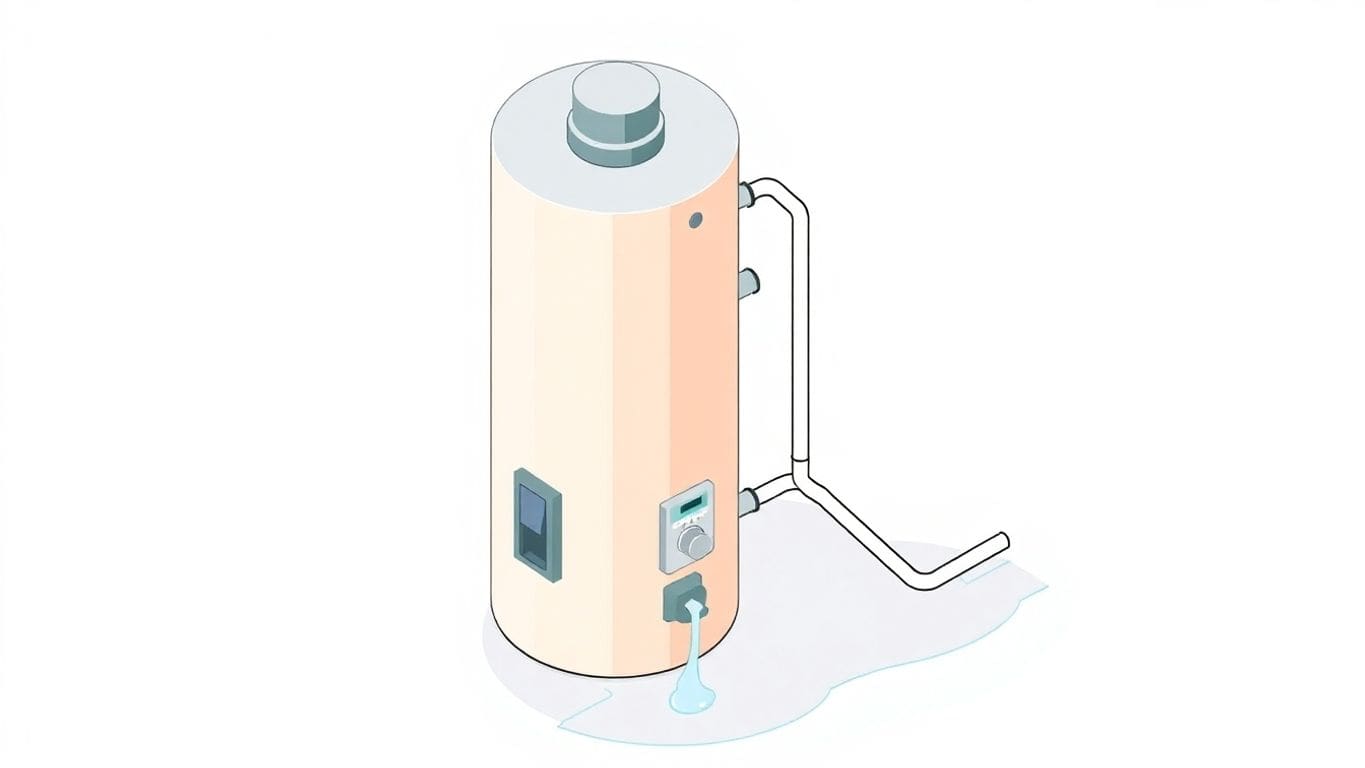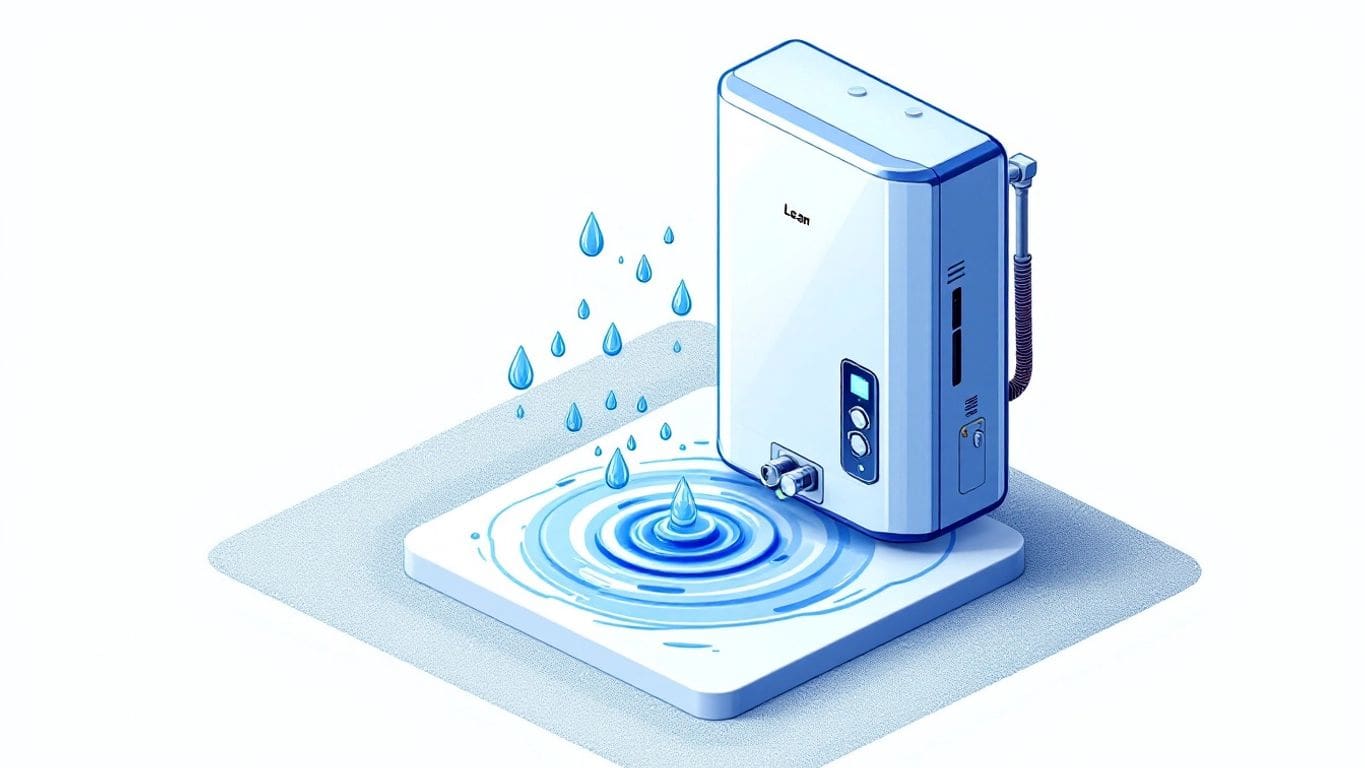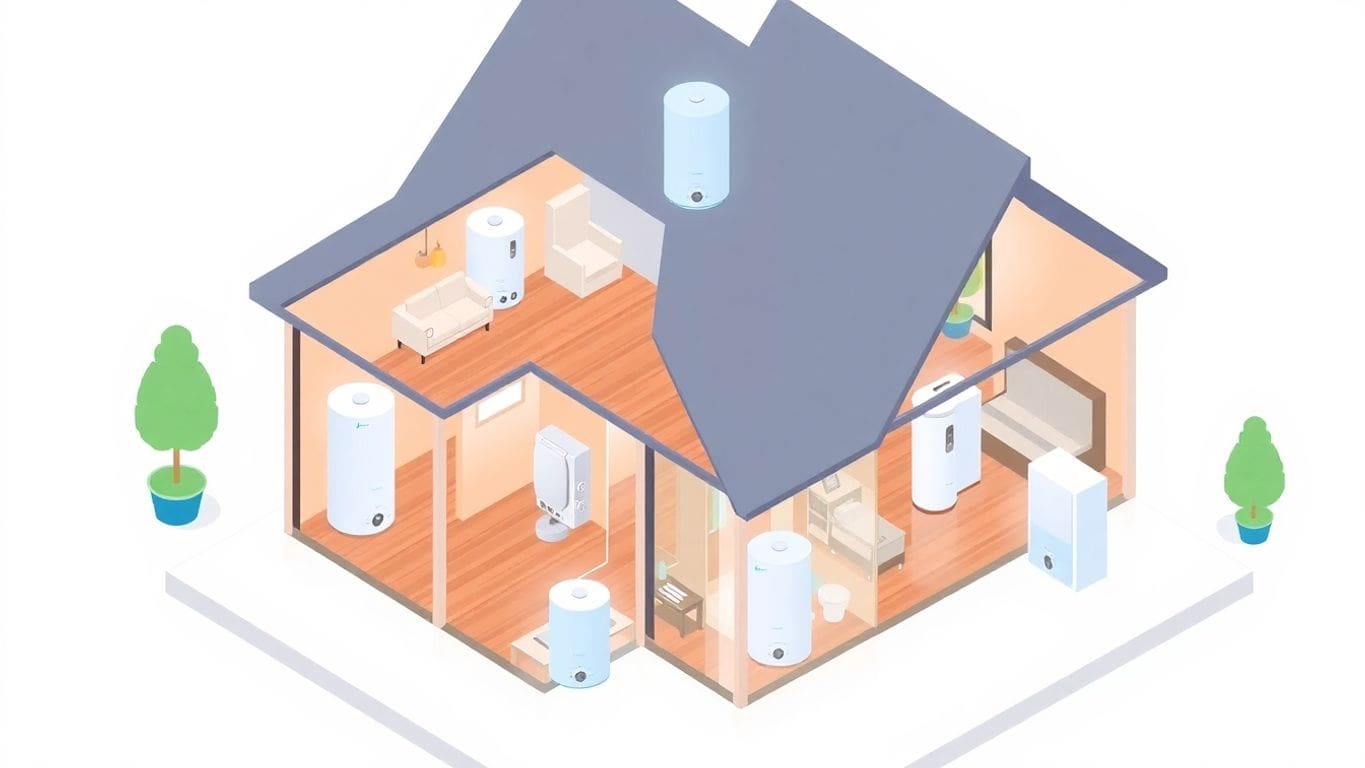
So, you’ve discovered a puddle under your water heater, and now you’re wondering if you can still use water in your home. It’s a common dilemma for homeowners. While a leaking water heater can be a headache, it doesn’t always mean you have to give up using water entirely. Before you start panicking, let’s break down what you need to know about using water when your water heater is acting up.
A leaking water heater can be a real headache. Several factors might cause your water heater to spring a leak. Here are some common culprits:
Spotting a leak early can save you a lot of trouble. Look out for these signs:
Different water heaters come with their own leak risks. Here’s a quick look:
When you notice a leak, it’s important to act quickly. Ignoring it could lead to bigger problems, like water damage or mold growth. If you’re unsure about handling it, consider troubleshooting with a professional to ensure everything is safe and sound.
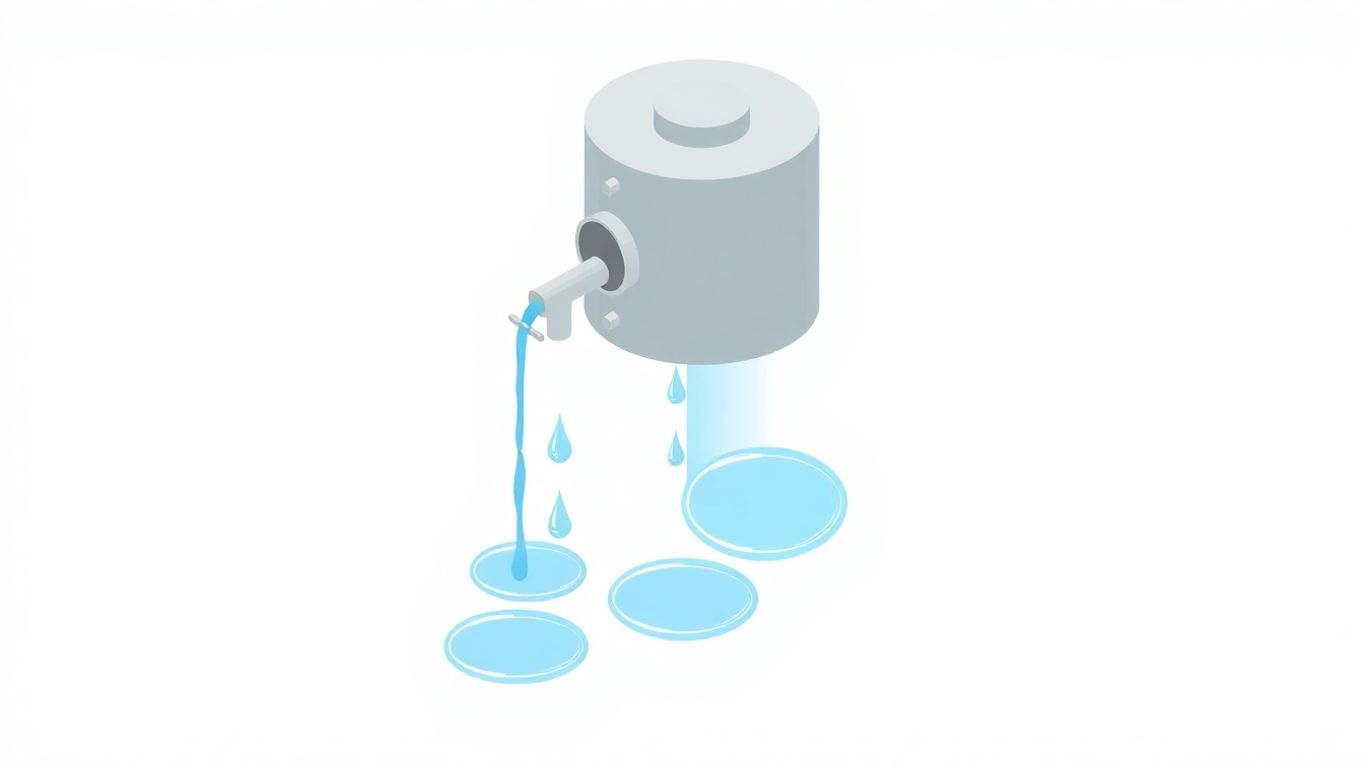
If your water heater is leaking, you can still use cold water. The leak usually doesn’t affect the cold water supply. Just be sure to turn off the heater to avoid further damage. This way, you can use cold water for things like washing dishes or taking a quick shower.
When your water heater leaks, it might still heat water, but this isn’t always safe. A leak can make the heater work harder, leading to more problems. You might notice less hot water or none at all. If you need hot water, think about heating it on the stove until the heater is fixed.
Using water while the heater leaks can be risky. Here are some potential issues:
If your water heater is leaking, it’s best to get it checked out soon. Ignoring it can lead to bigger problems, like water damage or even safety hazards. Always prioritize safety and consider calling a professional for help.
First things first, you gotta stop the water from flowing into the heater. Look for the cold water pipe connected to the top of your heater. There should be a valve on this pipe. Turn it clockwise until it stops. This action will prevent more water from entering the tank and making the leak worse.
Next, you need to turn off the heater itself. This is super important for safety. If you have an electric heater, find your circuit breaker and switch the water heater off. For gas heaters, turn the dial to the "pilot" setting. Always make sure the power is off before you start any repairs.
Now, it’s time to deal with the water that’s already leaked. Grab some towels or a mop to soak up the water. If you can, place a bucket under the leak to catch any dripping water. This helps to avoid damage to your floors and prevents mold from growing.
Taking these steps quickly can save you from bigger headaches down the road. A little effort now can prevent a lot of trouble later on.
Remember, handling a leak promptly can help avoid further damage to your home. If you’re unsure about anything, it’s always a smart move to call a professional.
When you first spot water around your heater, it might not seem like a big deal. But knowing when it becomes an emergency is crucial. A small, steady drip can quickly turn into a major problem. Start by checking the amount of water. If you find a large puddle or if water is gushing out, it’s time to act fast.
Ignoring a leak can lead to more than just a wet floor. Here are some risks:
Sometimes, DIY fixes won’t cut it. If you notice any of the following, call a plumber:
If you’re ever in doubt, it’s better to be safe and call a professional. They can assess the situation and prevent further damage. Remember, it’s not just about fixing the leak—it’s about ensuring your home stays safe and sound.
When your water heater leaks, finding the source is key. Start by looking at the pipes and connections. These areas often cause leaks if they become loose or worn out. Tighten any loose connections with a wrench. Next, inspect the pressure relief valve. This valve helps manage pressure inside the tank, and if it’s faulty, water might leak out. Also, check the drain valve at the bottom of the tank. If it’s dripping more than a little, it might need to be tightened or replaced.
Sometimes what looks like a leak might just be condensation. Condensation happens when the tank is much hotter than the air around it. To check for this, wipe the tank dry and see if water reappears on the surface. If it does, and it’s evenly spread, it’s likely condensation. If the water pools in specific spots, then you might have a leak.
If you’re still unsure, use soapy water to find leaks. Apply it to the suspect areas, like pipes and valves. If bubbles form, that’s where the leak is. It’s a simple trick that works well. If you have a gas water heater and smell rotten eggs, that’s a sign of a gas leak, which is more serious. In that case, turn off the gas and call a professional right away.
Remember, finding a leak early can save you from bigger problems later. It’s always better to fix small leaks before they turn into large ones. If you’re not comfortable doing this yourself, don’t hesitate to call a plumber.
When your water heater leaks, it can cause a lot of trouble. Water can ruin floors, walls, and even furniture. To stop this, you should act fast. First, clean up any water on the floor. Use towels or a mop to soak it up. If the water keeps coming, try putting a bucket under the leak. This helps catch the water and keeps it from spreading.
Mold loves wet places. If your water heater leaks, mold can start growing quickly. Mold is not just ugly; it can also make you sick. To prevent mold, keep the area dry. Use fans or open windows to let air in. If you have a dehumidifier, use it too. Keep checking the area for any signs of mold, like a musty smell or spots on the walls.
Water and electricity are a bad mix. If water from your heater gets near electrical outlets or wires, it can be dangerous. Turn off the power to the area around the heater if you can. This might mean flipping a switch in your circuit breaker. Be careful and don’t touch anything wet if you’re not sure it’s safe. It’s always a good idea to get help from a professional if you’re worried about electrical risks.
A leaking water heater can cause more than just a mess. It can lead to serious problems like mold and electrical hazards. Acting quickly and carefully can help keep your home safe and sound.
When your water heater leaks, the first thing to ask is whether it can be fixed. Small issues, like a loose connection, might be easy to handle with a wrench. But if the problem is with parts like the temperature or pressure relief valve, it might be time to call a pro. Messing with electrical parts can be dangerous, so leave that to the experts.
Think about the age of your heater. If it’s over ten years old, it might be time for a new one. Older heaters tend to have more problems, and fixing them might cost more in the long run. Also, check for rusty water or strange noises, which can be signs of bigger issues.
Sometimes, replacing the heater is the best move. If your heater is old and keeps needing repairs, a new one can save you money in the long term. New models are more efficient, which means they use less energy and can lower your bills. Plus, they offer better performance, giving you hot water more reliably.
If the tank itself is cracked, there’s no fixing that. A cracked tank means the heater is done for, and you’ll need a new one. Also, if you notice leaks coming from the tank, it’s a sign that replacement is necessary.
Repairing a water heater can cost around $600, but this depends on what’s wrong. If you need a new heater, expect to spend upwards of $3,500. So, while repairs might seem cheaper, they can add up over time, especially if your heater is old and keeps breaking down.
It’s smart to weigh the costs and benefits. Sometimes spending more now on a new heater can save you money later on repairs and energy bills.
A handy table to compare costs:
| Option | Estimated Cost |
|---|---|
| Repair | Around $600 |
| Replacement | Up to $3,500 |
In the end, consider your heater’s age, the cost of repairs, and the benefits of a new model. You might find that getting a new heater is the best choice for your home. If you’re unsure, consulting a plumber can help you decide whether to repair or replace your unit.
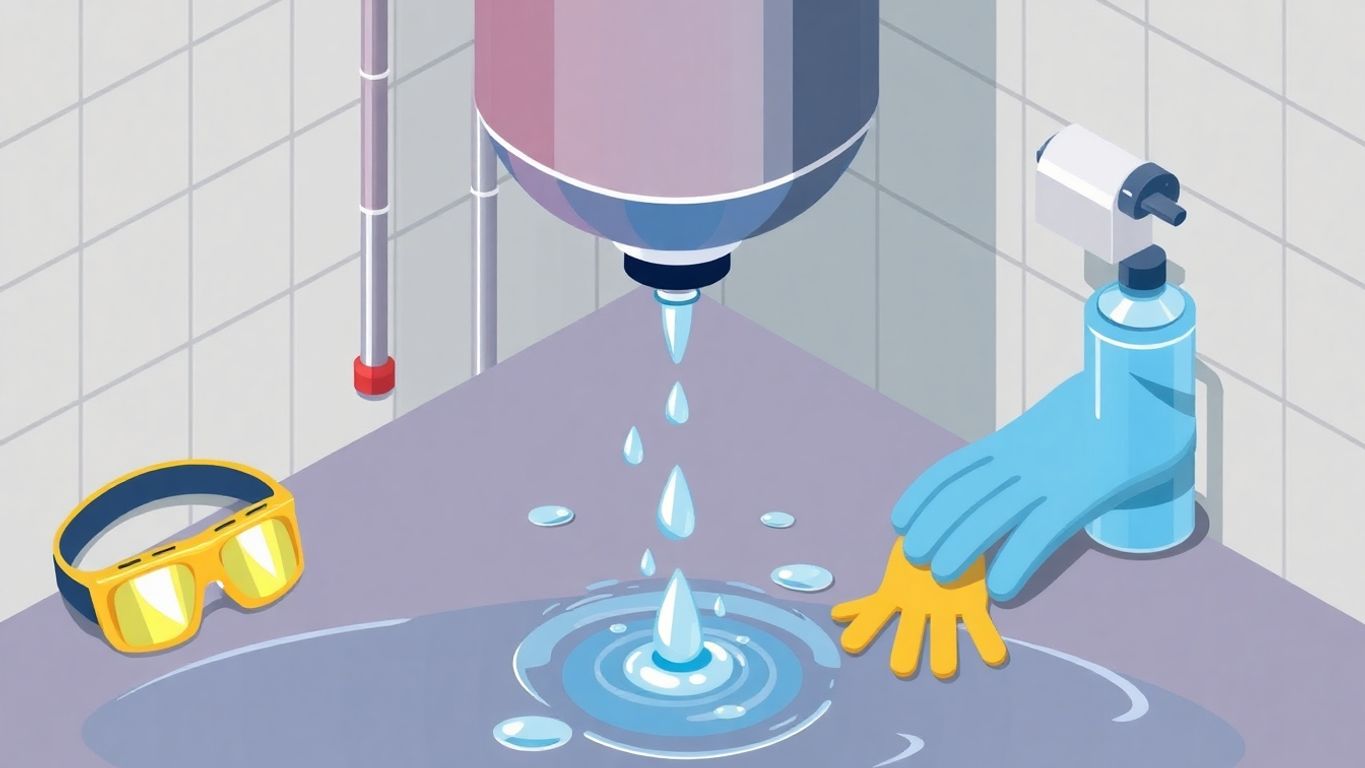
When dealing with a leaking water heater, safety is key. Always turn off the power before doing anything else. For electric heaters, switch off the power at the breaker box. If it’s gas, locate the shut-off valve on the gas line and turn it off. This step helps prevent risks like electrocution or gas leaks.
Water heaters can get very hot. To avoid burns, let the heater cool down before you touch it. Use gloves and wear safety glasses if you need to inspect or move anything. Remember, water and electricity don’t mix! Make sure everything is dry, and never stand in water while working on the heater.
Good ventilation is important, especially with gas heaters. Make sure the area around the heater is well-ventilated. This helps prevent dangerous gas build-up. If you smell gas, leave the area immediately and call a professional.
Safety first! Taking the right precautions can keep you and your home safe while you deal with a leaking water heater. Don’t rush, and if you’re unsure, call in a pro. It’s better to be safe than sorry.
Keeping your water heater in good shape is like taking care of a car. You should check it regularly. Look for rust or any signs of wear and tear. Flush the tank at least once a year to get rid of sediment. This helps your heater run better and last longer.
Sometimes, the best fix is a new heater. If your water heater is old, think about getting a newer model. New water heaters are more efficient and less likely to leak. They might cost more upfront, but they save money in the long run.
A leak detection system is like having a guard for your water heater. It alerts you if there’s a leak. Some systems can even shut off the water automatically. This can prevent a lot of damage to your home.
Taking these steps can save you from a lot of trouble. A little effort now can prevent big problems later. Keep your water heater in check, and it will take care of you.
You might think a tiny drip isn’t a problem, but even small leaks can lead to serious trouble. Ignoring a small leak can cause major water damage over time. It might also mean there’s a bigger issue with the heater. If you spot a leak, it’s best to get it checked out right away.
It’s true that older heaters are more prone to leaks, but new ones can leak too. Manufacturing defects or installation mistakes can cause leaks in newer models. Regular maintenance can help catch these issues early. If your heater is over 10-15 years old, it might be time to consider a replacement.
Trying to fix a leak yourself can seem like a good way to save money. But without the right skills, you might make things worse. This could lead to more expensive repairs down the line. Hiring a professional ensures the job is done right, and it might save you money in the long run.
Don’t wait to address a leak. Small problems can escalate quickly, leading to costly repairs and potential safety hazards. It’s always better to be safe than sorry.
Fixing a leaky water heater can be expensive. On average, you might spend around $600 if you hire a professional. This sounds like a lot, but remember, a brand-new water heater can cost over $3,500. So, in the long run, fixing might save you some cash.
When you fix a leak, extra costs can sneak up on you. Here are a few things to keep in mind:
It’s smart to set aside some money for unexpected home repairs. Here’s a simple way to budget:
Tip: Being prepared can make a big difference. A little planning goes a long way in avoiding stress when things go wrong.
First, turn off the water supply to the heater to stop more water from leaking. Then, switch off the power to the heater to avoid any accidents.
Yes, you can use cold water, but the water pressure might be lower. Make sure the leak isn’t worsening when you do this.
A leaking water heater can cause water damage and even lead to mold growth if not fixed. It’s important to address the leak quickly.
Check for active drips from the heater. Condensation usually forms evenly across the surface, while leaks will have a specific source.
If you can’t stop the leak by tightening pipes or if the leak is severe, call a plumber. They can assess the problem and offer a solution.
Yes, a small leak can lead to bigger issues like flooding or even electrical problems if not repaired promptly.
Turning off the heater won’t stop the leak, but it will prevent more water from being heated and leaking out.
Repair costs can vary, but fixing a leak early can prevent more expensive damages later. It’s best to consult with a professional for an accurate estimate.

